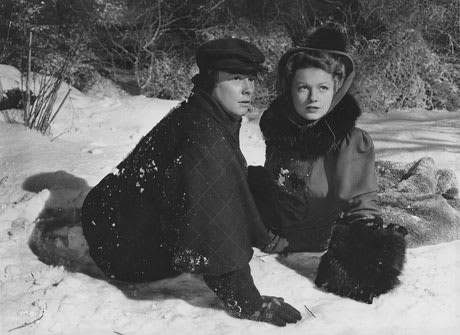Orson Welles's follow-up to Citizen Kane deals with many of the same themes: power, hubris, modernity and eventual comeuppance. But The Magnificent Ambersons (1942) takes a decidedly different approach and setting. The time is the late 19th/early 20th century, and "horseless carriages" are the current controversial invention. George Minnifer Amberson (Tim Holt) is the heir to the Amberson family name and fortune, and even as a child, he's a holy terror. Proud, vain, lazy and selfish, George is universally hated. His self-centred character eventually hurts many of those close to him, and the ultimate loss of the family fortune leaves him a broken, although apologetic, man. Formally, the film is a compendium of the Welles-ian tricks of the day: lengthy, winding tracking shots, deep focus and quick-cut montages of the rise and fall of fortune. But what stands up most remarkably in a contemporary viewing is the film's incredibly sharp black humour, combined with a healthy dose of the types of existential crises only too familiar to those of us in the so-called modern era. The film could have been made today by the Coen Brothers. Legendary actor Joseph Cotton plays a man developing early automobile technology, and profiting handsomely from it, but in a particularly thought-provoking scene he ruminates on the likelihood that cars will certainly neither improve the soul of man nor the beauty of nature; in fact, he believes the opposite is likely. The disc boasts that film has been "digitally remastered for enhanced picture and audio quality," and it certainly looks and sounds quite good, although it's difficult to compare, since this is its debut on DVD. The version on the disc is, of course, the standard studio cut (the mythical original version that Welles reportedly created has never been seen, or proven to exist). The originally theatrical release was an infamous failure, most likely due to the fact that Welles didn't supervise the final cut, and an artificial happy ending was tacked on. But after re-working this initial failure, we have been left with a remarkable 88-minute film (certainly short of Welles's original intentions, but still a solid piece of cinema). If only the lessons that the film so unapologetically deliver to the spoiled George could somehow be learned by our arbitrarily wealthy and spoiled brats of today. The disc contains no special features.
(Warner)The Magnificent Ambersons
Orson Welles

BY Jovana JankovicPublished Jan 18, 2012